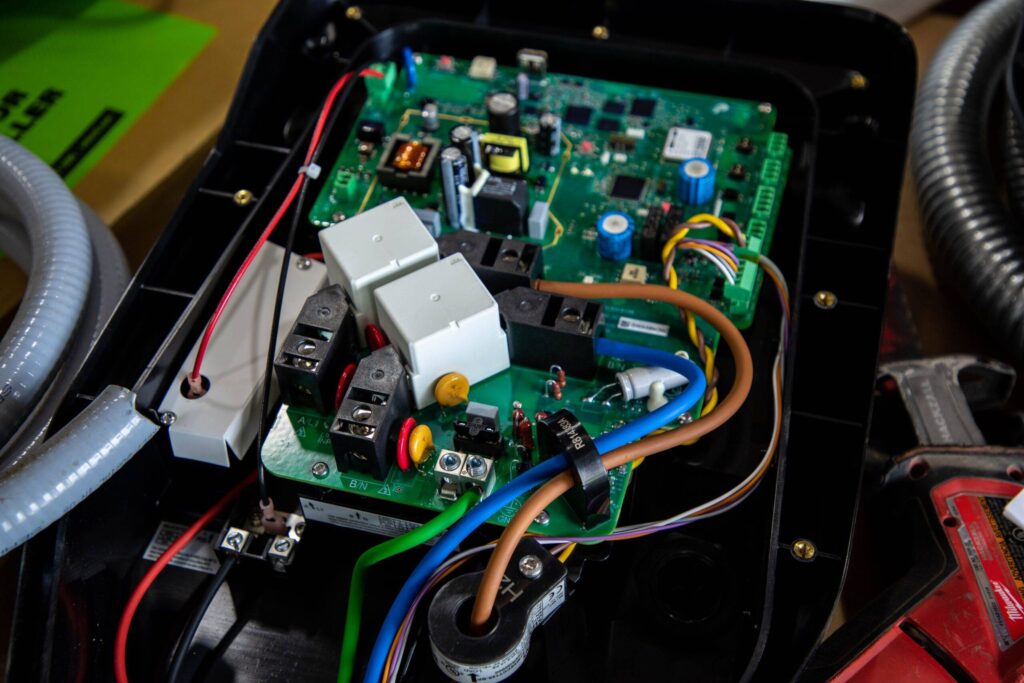Electric vehicles (EVs) have transitioned from a futuristic concept to a mainstream reality. EV charging is reshaping the automotive industry and driving significant changes in our electrical infrastructure.
At Rogers Electric, we are excited about the potential of EVs to revolutionize transportation. Therefore, we are committed to helping businesses and communities adapt to this new era. Let’s explore the history of EV charging and its promising future ahead.
The History of EV Charging
The journey of EV charging began in the early 20th century with the development of electric cars. However, it wasn’t until the late 1990s and early 2000s that EVs started to gain significant traction. The introduction of hybrid vehicles like the Toyota Prius and fully electric cars like the Nissan Leaf and Tesla Roadster marked a turning point in the adoption of EV technology.
In the beginning, early EV charging solutions were limited and often required specialized equipment. Public charging stations were scarce. Not only that, but home charging was done using standard electrical outlets. However, these were very slow to charge. As EVs became more popular, the need for better charging infrastructure grew.

EV charging methods have changed dramatically over the years.
Source: Rogers Electric
The Future of EV Charging
The future of EV charging looks bright. Advancements in technology, increased government support, and growing consumer demand for sustainable transportation options are driving this change. As a result, by 2025, 1 out of 5 new cars sold will be electric vehicles.
Key trends include:
- Fast and Ultra-Fast Charging: Modern EVs and charging stations are moving towards fast and ultra-fast charging capabilities. These stations can charge a vehicle’s battery in minutes rather than hours. As a result, drivers can now travel longer distances without worrying about long charging times. Moreover, this makes EVs more practical for everyday use.
- Wireless Charging: Wireless or inductive charging technology is on the horizon. This helps promise a more user-friendly experience. Now, vehicles can charge automatically when parked over a charging pad. Therefore, this eliminates the need for physical plugs and connectors. As a result, this technology makes charging your car as simple as parking it.
- Smart Charging Networks: The integration of IoT and smart grid technologies allows for smarter charging networks. Therefore, this means that charging can be scheduled during off-peak hours when electricity demand is lower. In return, this helps lower costs for consumers.
- Expansion of Charging Infrastructure: Governments and private companies are investing lots of money in expanding the charging infrastructure. By 2030, the investment in EV charging infrastructure is projected to reach $300 billion, with 20 million new EV chargers to be installed. Specifically, in the U.S. alone, the Department of Energy estimates that 2.8 million EV charging ports will be necessary to support the growing number of electric vehicles. This includes more public charging stations in urban areas, along highways, and in rural regions. This helps ensure that EV drivers have access to reliable charging options wherever they go. Now, drivers can find convenient places to charge their vehicle.

Electric vehicle (EV) charging is changing the future of our society.
Source: Adobe Stock
Transforming the Electrical Infrastructure
The rise of EVs and the expansion of charging infrastructure are driving significant changes in our electrical systems and urban landscapes. By 2030, it is estimated that there will be 240 million electric vehicles on the road.
Key changes include:
- Increased Energy Demand: EV charging adds a substantial load to the electrical grid. Therefore, utilities must adapt by upgrading infrastructure, expanding capacity, and integrating smart grid technologies to ensure reliable power delivery.
- Decentralized Energy Systems: As EV adoption grows, there is a shift towards decentralized energy systems. As a result, homeowners and businesses are installing solar panels and energy storage solutions to power their EVs. Consequently, this will help reduce their dependence on the traditional grid. This shift promotes sustainable energy practices.
- Urban Planning and Design: The integration of EV charging stations into urban planning is reshaping cityscapes. Parking lots, residential areas, and commercial properties are being designed with EV charging in mind. For example, this includes incorporating charging stations into building designs and creating dedicated EV charging zones in public spaces.
- Economic Opportunities: The growth of the EV market presents new economic opportunities for businesses. Companies like Rogers Electric are at the forefront, providing expertise in the installation and maintenance of EV charging stations. This includes training new workers, developing new products and services, and creating jobs in the growing green economy.
Rogers Electric: Leading the Charge
At Rogers Electric, we are dedicated to supporting the transition to electric vehicles and the development of sustainable electrical infrastructure. Our team of skilled technicians and project managers is experienced in the design, installation, and maintenance of EV charging stations for commercial properties. We work closely with our clients to ensure their charging solutions are efficient, reliable, and tailored to their specific needs.

Rogers Electric can help install EV chargers in your business.
Source: Rogers Electric
Our services include:
- Consultation and Planning: We start by assessing your current electrical infrastructure and determining the best locations for EV charging stations. We consider factors such as the number of EVs expected to use the stations, the types of charging required, and the available electrical capacity.
- Installation and Integration: Our team handles the installation of EV charging stations, ensuring that they are properly integrated with your existing electrical systems. We use the latest tools and techniques to ensure that the installation is done safely and efficiently.
- Maintenance and Support: We provide ongoing maintenance and support to ensure that your EV charging stations continue to operate smoothly. For example, this includes regular inspections, troubleshooting, and repairs as needed.
We believe in the potential of EVs to create a cleaner, more sustainable future, and we are proud to play a role in making that future a reality. For more information on how Rogers Electric can help you implement EV charging solutions, contact us today. Let’s work together to power the future of transportation.


